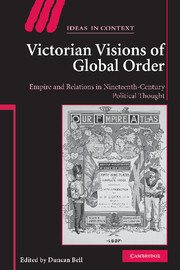 Victorian Visions of Global Order
Victorian Visions of Global Order Published online by Cambridge University Press: 22 September 2009
INTRODUCTION
In textbooks on the history of international law, the nineteenth century is depicted as a period that saw the transformation of a Law of Nations applicable to a family of Christian and European peoples into a body of international law common to a society of civilised nations. This general development – in no small part due to the global influence of Britain – took place in the context of an uneven and gradual extension of the states system. Especially in continental versions of the history of international law, which are premised on a close relationship between political and intellectual power, the nineteenth century is therefore often delineated as ‘the British era’. Meanwhile, theoretical debates over international law are identified, in slightly teleological fashion, as moving from a ‘rationalist natural law and abstract character’ towards considerations of state practice: in short, from naturalism to positivism. While such a change of attitude is certainly detectable, this narrative simplifies a much more complex and variegated story. The literature on the intellectual history of nineteenth century Britain has tended to treat international, including international legal, questions only tangentially. Moreover, a recent and extremely valuable account of the rise of international law, which identified a ‘late-Victorian reformist sensibility written into international law’, lacks a specifically British perspective.
To save this book to your Kindle, first ensure no-reply@cambridge.org is added to your Approved Personal Document E-mail List under your Personal Document Settings on the Manage Your Content and Devices page of your Amazon account. Then enter the ‘name’ part of your Kindle email address below. Find out more about saving to your Kindle.
Note you can select to save to either the @free.kindle.com or @kindle.com variations. ‘@free.kindle.com’ emails are free but can only be saved to your device when it is connected to wi-fi. ‘@kindle.com’ emails can be delivered even when you are not connected to wi-fi, but note that service fees apply.
Find out more about the Kindle Personal Document Service.
To save content items to your account, please confirm that you agree to abide by our usage policies. If this is the first time you use this feature, you will be asked to authorise Cambridge Core to connect with your account. Find out more about saving content to Dropbox.
To save content items to your account, please confirm that you agree to abide by our usage policies. If this is the first time you use this feature, you will be asked to authorise Cambridge Core to connect with your account. Find out more about saving content to Google Drive.